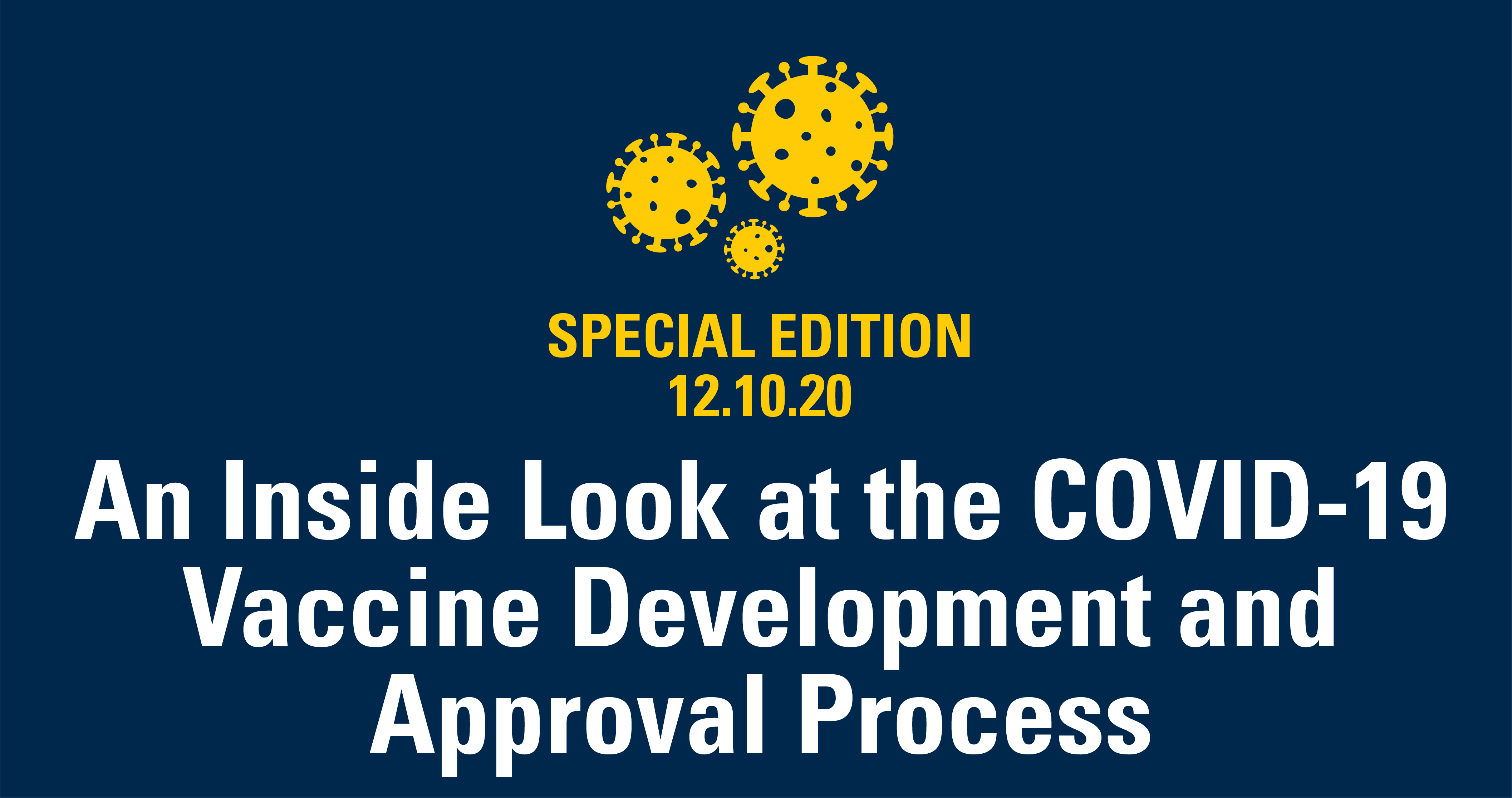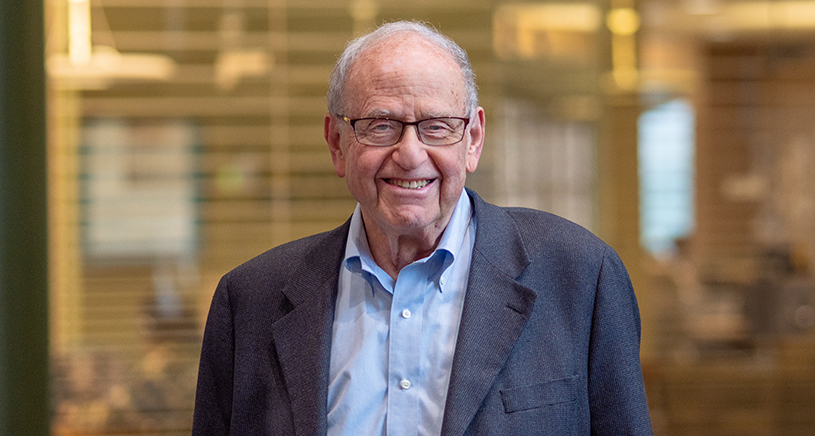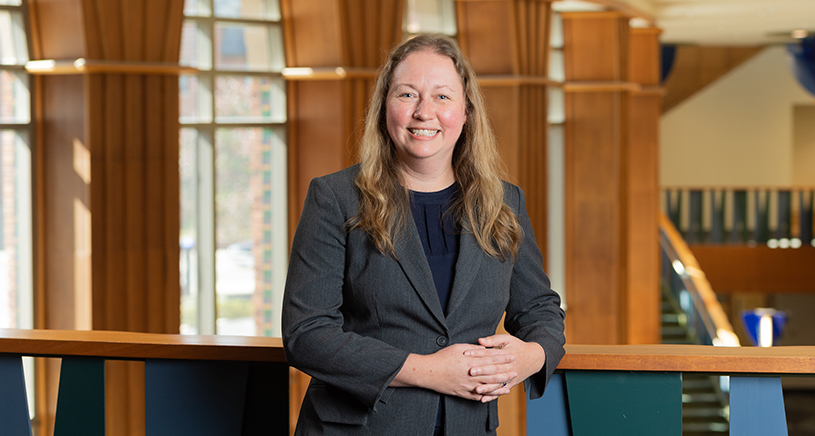An Inside Look at the COVID-19 Vaccine Development and Approval Process

In this episode infectious disease expert Arnold Monto discusses the COVID-19 vaccine development and approval process. Monto is a Professor of Epidemiology and Global Public Health at the University of Michigan School of Public Health. Throughout his six decade career, Monto has been involved in pandemic planning and emergency response to influenza and other respiratory virus outbreaks, including the 1968 Hong Kong influenza pandemic, Avian Influenza, SARS, MERS and the COVID-19 pandemic. He currently serves as acting chair of the vaccines and related biological products Advisory Committee, which provides advice to the Food and Drug Administration on the authorization and licensure of vaccines to prevent COVID-19.
Also in this episode, Dr. Emily Martin, an associate professor of epidemiology at Michigan Public Health, helps guide us through some commonly asked questions about the safety and distribution of the new vaccine. Dr. Monto and Dr. Martin co-lead the Michigan Influenza Center, one of five centers across the country that collects data for the Centers for Disease Control and Prevention.
|
Subscribe and listen to Population Healthy on Apple Podcasts, Spotify, Google Podcasts, iHeartRadio, YouTube or wherever you listen to podcasts! Be sure to follow us at @umichsph on Twitter, Instagram, and Facebook, so you can share your perspectives on the issues we discussed, learn more from Michigan Public Health experts, and share episodes of the podcast with your friends on social media. |
00:04 Narrator: Hello and welcome to Population Healthy, a podcast from the University of Michigan School of Public Health. This episode is part of a series of special editions of our podcast, focusing on the ongoing Coronavirus pandemic.
Arnold Monto is a Professor of Epidemiology and Global Public Health at the University of Michigan School of Public Health. Throughout his seven decade career, Monto has been involved in pandemic planning and emergency response to influenza and other respiratory virus outbreaks, including the 1968 Hong Kong influenza pandemic, avian influenza, SARS, MERS and the COVID-19 pandemic. He currently serves as acting chair of the vaccines and related biological products Advisory Committee, which provides advice to the Food and Drug Administration on the authorization and licensure of vaccines to prevent COVID-19. In a recent webinar, he talked about the lightning fast vaccine development process undertaken by the apply named operation warp speed.
01:04 Monto: We've all heard about operational warp speed, this sounds kind of strange and suggests that there's undue speed associated with the development. And in fact, that's not the case. What is happening is that we are putting into a one-year period what typically takes maybe 15 to 20 years in terms of vaccine development. And how are we doing that? Well, it's because immunity seems to be related to a specific protein, the spike protein, which allows entry of the virus into the cells. And we are indeed fortunate that this spike protein was identified in earlier work with SARS and MERS-related Coronavirus as the important component of the vaccine, so that development could move quickly. And all of the vaccines that are being developed, whatever the platform, whatever the way they have been produced are related to the spike protein.
We are also telescoping the studies. Where we would have been doing things in sequence and instead we're doing them in parallel. For example, we would never think of manufacturing and getting vaccines ready to go before they were tested and proven. There has been a lot of attention to this and also a lot of funds given to this effort. So this is one of the major success stories of the response to the pandemic. We are doing exactly what we ordinarily do with vaccine development, but on a shorter timeline.
02:54 Narrator: Emily Martin is an Associate Professor of Epidemiology at the University of Michigan School of Public Health. Her research focuses on respiratory virus epidemiology, hospital epidemiology, infection prevention and molecular epidemiology. She and Monto co-lead the Michigan influenza Center, one of five centers across the country that collects data for the Centers for Disease Control and Prevention. She posed some common questions about the COVID-19 vaccine to Monto.
03:20 Martin: In terms of the way the trials have gone and the fact that we're kind of compiling all of the questions for a vaccine trial into one big trial for every product, what does this mean for safety and efficacy data for populations where there would typically be a special trial just for this population. So one big example is pregnant people. We typically would have a trial just for pregnant people. What does this strategy mean for safety and efficacy data?
03:44 Monto: Well, I'm not sure that there's really typically a trial in pregnant women for most vaccines. In fact, most vaccines are used in pregnant women on the basis of observational studies, and part of that is because the companies typically do these trials and they're terribly concerned about liability as they do studies in pregnant women. The most recent studies that we've seen in pregnant women, and this is relatively unique in RSV and influenza trials being directed to pregnant women often to see if it protects their offspring against the particular illness. We are recommending vaccines for pregnant women for flu, a high priority at WHO, on the basis of mainly observational studies. And I think as we go forward with these COVID vaccines, given the fact that nobody will wanna be in a placebo group anymore, we're going to have to rely on observational studies and good observational studies to give us the information we need. This is the first generation of COVID vaccines. We may have improved vaccines come up later on. And how do you study those? You're gonna have to study them in comparative trials. How are you gonna be able to say which vaccine gives you longer protection? That's gonna be, again, observational data.
05:06 Martin: It's gonna look like the last couple of years of flu vaccine, where you have all these different products on the market. Everybody's trying to figure out which, what, should they drive to this pharmacy and get this vaccine, or that pharmacy and get that vaccine.
05:15 Monto: There's no incentive for companies to do this unless they're really convinced that they can make money and that their vaccine will prove superior.
05:25 Martin: Can we talk a bit more about side effects and particularly side effects as they pertain to the fact that we've got all these different types of platforms. Are the side effects coming out of the trials, primarily injection sites, a couple of days, or are they long-term side effects that are being seen?
05:42 Monto: There are mild acceptable side effects to these vaccines. They're not long-term side effects, and interestingly, they seem to be associated more, at least with some of the vaccines with the second shot than the first shot. This is part of the dose findings, so you try to figure out what's tolerable in terms of side effects and what gives you the best vaccine response in terms of antibody.
06:09 Martin: I think the American public is so used to flu vaccine campaigns and flu vaccine campaigns are so centered around the one dose strategy, where you just find people wherever you can find them and you give them a dose and they’re good for the season, well, depending on how effective the flu vaccine is that year, right.
06:22 Monto: And then we hope it works.
06:24 Martin: Yes, we hope it works. This is a two-dose strategy, which is operationally, fundamentally different in how we think about things, especially when you have multiple products and I want to get product A and then get product A again. Can you kind of explain for the audience why are we even going down this road? Why are two doses important?
06:46 Monto: Well, two doses seem to be much more protective than one does. Some of the studies may show, and they are looking at people who were infected during the clinical trials after the first dose, and we may see whether there is some level of protection. Right now, all of the data are for the two-dose strategy. So it is important for people to get the second dose and for healthcare providers to know what the first dose was so that they could give the right second dose, unless we have regional differences. So everybody in one region, because of availability is getting one vaccine, and in some other areas that are getting another vaccine. But that's where we are now. We just have to remember, we didn't even have the sequence of this virus until January 2020 when the Chinese let us have it. Look how far we've gone, since we've got that sequence.
07:51 Martin: A little bit of a different topic now, there's been a lot of papers, particularly recently on changes in the virus and genetic changes in the virus. Is that gonna have any impact on vaccine effectiveness? Like we're so used to hearing with influenza, vaccine effectiveness being impacted by change in the virus.
08:08 Monto: Well, while the virus is changing somewhat, it's not changing enough to escape the vaccine. Whether that's gonna last, who knows. The positive is that we have been living with four seasonal coronaviruses, which cause common colds, and those viruses have been just about the same for the 50 years I've been involved in studying them. So we can still see the same genes associated with those viruses that have produced antibodies. That's the good news. The bad news is that we do see re-infection with these viruses. So first things first, we can stop the pandemic through use of the current vaccines and through unfortunately the herd immunity that's building up because of bad behavior. Bad behavior may be having good results in terms of getting natural infections producing antibodies in the population, which didn't happen last spring. And that combined with the vaccine is going to result, I would predict, in a decrease in transmission in our populations.
09:21 Martin: Changing topics again slightly, what are we gonna do about the kids and the teens?
09:25 Monto: I’m not sure where this emergency use will end in terms of age. Some of the studies have been done down to 12 years of age. They have not been done in younger children. It's the teens that have been getting infected and some of them have been getting sick. So I would predict that as we go forward, we may well, slowly use the vaccines in older children before we go to younger children.
09:54 Martin: When do you think life is gonna feel normal again? Or are we sort of forever changed as a society in how we interact with people?
10:06 Monto: I'm not gonna go into the socio-economic considerations, whether big office buildings will ever be filled the way they have been in the past, whether some of the things that we've done have changed. I'll just tell you my own view, that it is so much more efficient, you and I are down the hall from each other and getting things done than having to communicate the way we're communicating now. I think we'll be back to that level probably, if not in the middle of the spring, probably by early summer, because I think we're gonna see seasonality, it's gonna be much more like flu outbreaks, which behave themselves. This one has not behaved itself. I was surprised we had as much transmission over the summer as we did, and it's probably because we had nobody immune. So we're gonna have a lot of people immune. We may not ever see stopping of transmission, at least in the middle of the winter, but things are gonna be a lot more like normal.
11:08 Martin: When a vaccine is available for you, are you going to get it? And does that answer depend on which vaccine?
11:14 Monto: It won't depend on which vaccine. I will get it, but since I've been happily living, not going outside, I wanna be sure that those people who are more at risk get at first. Then I will happily get the vaccine. I think that we should move ahead and get vaccinated when it's our turn to get vaccinated, because I think this is being looked at very carefully. Our local authorities who are gonna be under tremendous strain handling a pandemic and now also trying to organize the distribution of vaccine. Let's support them as best we can.
11:58 Narrator: This has been a special edition of Population Healthy, a podcast from the University of Michigan School of Public Health. During the ongoing coronavirus pandemic, we’ll work to bring you analysis from our community of experts to help you understand what this public health crisis means for you. To stay up-to-date in between special edition episodes, be sure to check out our website publichealth.umich.edu, subscribe to our Population Healthy newsletter at publichealth.umich.edu/news/newsletter and follow us on Twitter, Instagram, and Facebook @umichsph.
In This Episode
 Arnold Monto, MD
Arnold Monto, MD
Thomas Francis, Jr. Collegiate Professor of Epidemiology and Global Public Health at the University of Michigan School of Public Health
Dr. Monto's primary current concerns include occurrence, etiology and prevention of infectious diseases in industrialized and developing countries; frequency and cause of respiratory infections in families living in the community, and in factors which predict the occurrence and prevention of these illnesses; research and training to respond to bioterrorist threats. Throughout his career spanning six decades, Dr. Monto has been involved in pandemic planning and emergency response to influenza and other respiratory virus outbreaks, including the 1968 Hong Kong influenza pandemic, avian influenza, SARS, MERS and the COVID-19 pandemic. Learn more.
 Emily Toth Martin, PhD, MPH
Emily Toth Martin, PhD, MPH
Associate Professor of Epidemiology at the University of Michigan School of Public Health
Dr. Martin’s research focuses on respiratory virus epidemiology, hospital epidemiology, infection prevention and molecular epidemiology. She and Monto co-lead the Michigan influenza Center, one of five centers across the country that collects data for the Centers for Disease Control and Prevention. Learn more.
